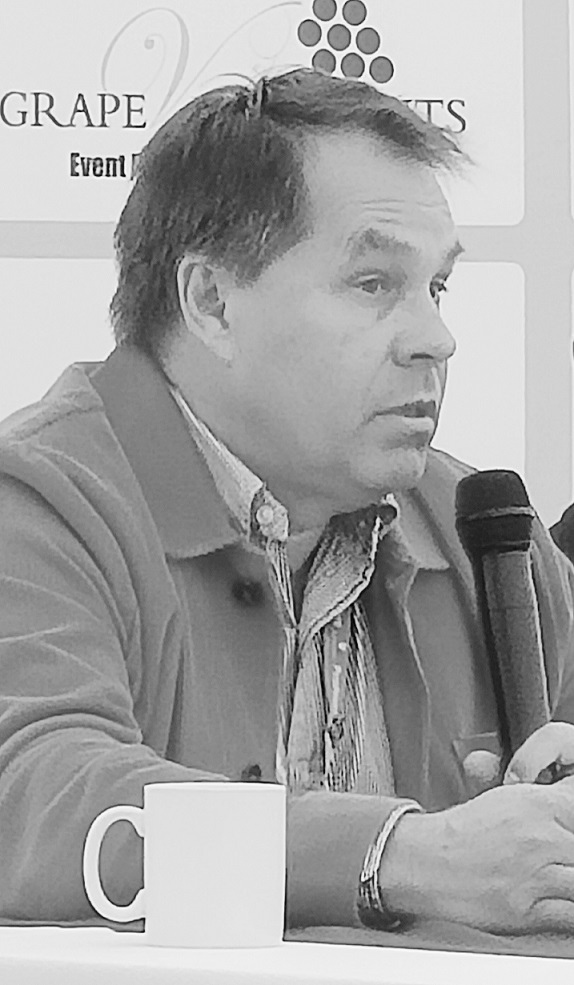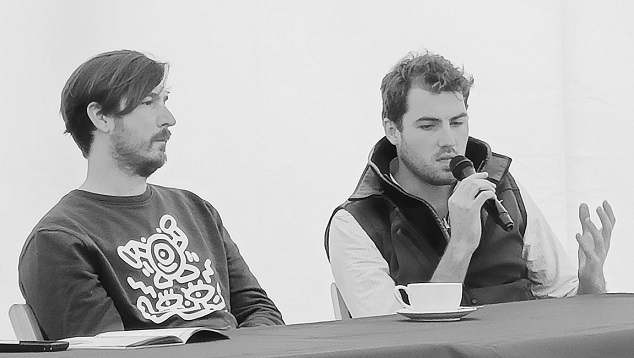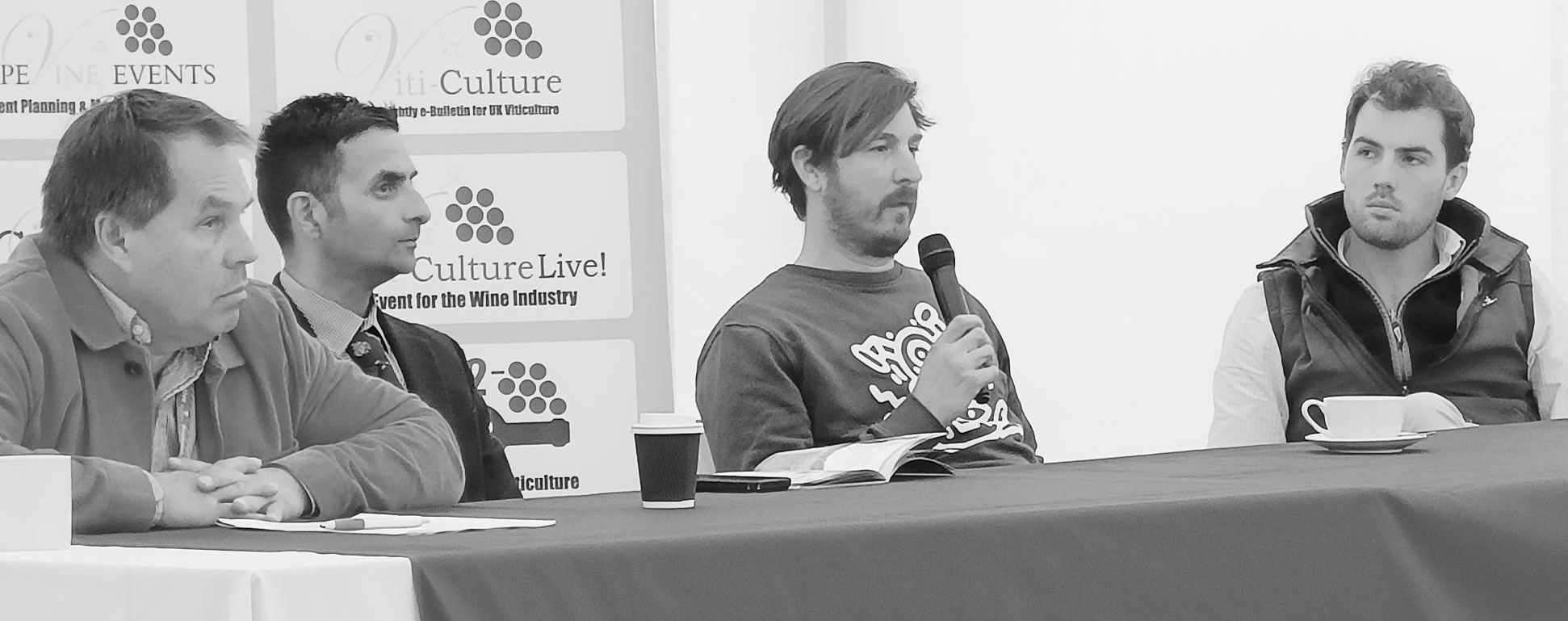It was led by Dr Gregory Mark Dunn, an Australian who is now head of the wine division at Plumpton College, the UK’s centre of excellence for wine education. The main speakers were Ben Brown, a viticultural agronomist at Agrii who works across a number of vineyards in England, and Sergio Verrillo, owner of London urban winery Blackbook Vineyard. Sergio has worked in California, Burgundy, Stellenbosch and New Zealand, and focuses on Pinot Noir and Chardonnay – but he has also been experimenting with hybrids such as Seyval Blanc, Cabernet Noir, Sauvignac and Pinotin. These experiments, he says, “keep us on our toes. Sometimes they are even added to the line-up if our creations work”.
‘They are definitely part of the future’
What are piwis?

Dr Gregory Mark Dunn (above): “It’s a shortening of a very long German word (PilzWiderstandsfähig) that describes fungal resistant grapevines. That’s what they are and that’s why they offer so many opportunities.
“They are important to a lot of winegrowing regions around the world. I was on the phone to Sam Doncaster (a British-born viticulturist who is involved with piwi breeding programmes and field selections in Germany) last week… Sam is one of the most passionate advocates of piwis in the world. He works with Freytag Nurseries, promoting and disseminating piwis and he was telling me that at the moment they are finding it very difficult to keep up with demand and it’s not necessarily alternative vineyards that want to plant something different, there’s a lot of demand from traditional vineyards and conventional winemakers, so I think they are definitely part of the future.
“To understand why they are important and how they work, I need to take you back to the disease triangle… First of all, we need a pest – like powdery mildew spores in the atmosphere. We need the environment to be conducive to that pest and, unfortunately in England, environments are often conducive to both downy mildew, powdery mildew and even botrytis. And last of all we need a host. And this is where piwis come in. So, the host has to be something that’s susceptible to the disease. If you have all those things, you get an outbreak of the disease that you have to manage…
“We have the environment, we have the pest. We try to manage the environment as much as we can by the way we manage the canopy and vineyard floor. We try to manage the pest as much as we can with an array of sprays and other options. But we really don’t have much of an option to manage the host. In a lot of other agricultural industries, they have been able to breed in resistance. We haven’t been able to do it so well in viticulture because those North American varieties (that are resistant to mildew) haven’t been very good for winemaking. So, although we’ve done a lot of breeding between Vitis vinifera and those other varieties, it has ended up with grapevines that have fruit that is not very good for winemaking. This is where the piwis come in. The piwis are an attempt at that approach, so they do have a little North American variety in them, but they have a lot of Vitis vinifera in them and we have, over time, learned how to breed the grapevine so we can get some of the resistance but also we can get rid of some of the negative fruit composition characters that we don’t want to see.”
What are the opportunities?
Dr Gregory Mark Dunn: “They offer the vineyard the opportunity to use less pesticides and the ability to reliably ripen croppable yields. Along with those two things, if you are spraying less there are less tractor passes. That obviously reduces emissions, but it also means the soils are not as vulnerable to structural decline and compaction, so there are some significant advantages there.“In terms of the viticulture, because they have got so much vinifera in them, I don’t think the viticulture is that different. I think the canopy management is pretty similar because we manage canopies not just for disease – we manage canopies for ripening. One of the things we don’t know, and where we need more research, is if can we spur-prune piwis. If we can and if we make a still wine, I think there is the opportunity for mechanisation, which will also significantly reduce the cost of production.”
What are the challenges?
Ben Brown: “There are a couple of issues when it comes to managing piwis in the UK and that’s maintaining their disease resistance. In wheat, for example, we’re constantly breeding new varieties of wheat every year to maintain resistance to fungal pathogens. The process is obviously a lot slower with grapes; it’s more like a 25-, 30-year process of breeding a new grapevine compared to seven or eight for a new variety of wheat, so maintaining that disease resistance is obviously something we’ve got to take into account when we’re doing fungicide programmes. The other big threat or common misconception about piwis is their tolerance to all diseases. Depending on the piwi, there are obviously loopholes with diseases like black rot and anthracnose which are generally less of an issue but as diseases they can cause a lot of crop loss.”Are there any other potential concerns?
Ben Brown: “They seem to have a lot more vigour, so that’s a big issue. With Voltis (a crossing of Villaris X Mtp 3159-2-12), the first two buds are like Chardonnay, so it is not very fruitful on the first two buds so it will lean towards Guyot (training systems) as opposed to spur-pruning.”Is the vigour going to cause issues with nutrition?
Ben Brown: “Not directly. You might cut out a bit of nitrogen application. They definitely do seem to suffer more from magnesium deficiency and sometimes potash deficiency, just as varieties. But I don’t know if that’s a result of vigour; I’d say it’s more a result of the American hybrids (in them).”As you’ve designed a few spray programmes for piwis, what’s the average number of sprays you recommend?
Ben Brown: “It depends on the piwi and also the vineyard and the management. A lot of it is about fitting them into the management of the rest of your vines. So, it might just be skipping a few sprays here and there. I’d say you’re potentially talking around four to six across the whole year. I think the big issues for me would be early season black rot up to veraison and that could be – depending on rain pressure – three to four sprays and then hopefully they could incorporate some late-season botrytis protection. But generally, it’s pretty minimalistic.”Which are the best piwis from your point of view?

Ben Brown (right): “The initial resistant varieties were single crosses; these newer varieties are vinifera crossed with American varieties crossed again with a complete vinifera, so you’re getting less and less American variety and more and more vinifera – which is ideal for what we’re looking for from a winemaking point of view.”
Sergio Verrillo (left): “We’ve worked from day one with Seyval Blanc which we make into a col fondo long-ageing sparkling wine. Over the years we’ve worked with Cabernet Noir (a Swiss hybrid of Cabernet Sauvignon and an undisclosed disease-resistant variety) and more recently Sauvignac (a crossing of Sauvignon Blanc x Riesling x resistance partners) and Pinotin (a complex crossing of Cabernet Sauvignon x (Silvaner x (Riesling x Vitis vinifera) x (JS 12417 x Chancellor)).
“All of which have a real place in the winery and serve the winemaking. We’re unusual (in the UK) in that we specialise in still wines. So, with these piwi varieties and hybrids, there’s a real opportunity to create wines that have much better phenolic ripeness than Pinot Noir and Chardonnay, for example. So, for us, it’s a real opportunity to push the boat out and see what we can do. In winemaking you have to look at the commerciality of it.
'It’s a real opportunity to push the boat out and see what we can do'“We’re very much about sustainability so that, for me, was always the reason why we’ve geared more towards experimenting with piwis over the years.
“Production-wise, we’ve done a lot of different things. We’ve done whole bunches of Cabernet Noir, we’ve done some skin contact with Ortega, we did a cold soak on Sauvignac – there are ways to work and make a quality wine. That being said, I’ve found Pinotin to be quite difficult as a single varietal. It’s always worked really well in our field blend – it’s added colour and alcohol. It’s quite a simple varietal in terms of flavour profile and actual structure.”
Are the wines difficult to sell?
Dr Gregory Mark Dunn: “There is a challenge with regard to marketing and customer perception. On one side you’ve got something that is potentially more environmentally friendly and more sustainable but on the other side you’ve got something that is not a reference wine and it’s not recognised by the customers.”Tim Wildman MW, who runs Lost In A Field, a project which takes German hybrids planted in the UK in the last century and turns them into pet-nats using natural winemaking methods: “When I mention piwis, people say that’s going to be an interesting marketing effort, isn’t it? Because it’s called pee and wee. And in English, it’s obviously not the best thing when you’re talking about flavourful wines. So, when you’re talking about marketing and piwis you’ve got to change the name and change the perception.”
Sergio Verrillo: “We spray less, so that’s appealing to our consumer base. However, they are much more of a hand sell. We’ve found the ‘ignoble’ varieties do really well in restaurants and wine bars – by the glass, pairings. Where non-noble varieties or hybrids do poorly is retail. People are not typically going to grab a bottle of Pinot Noir Précoce off the shelf.
“Both domestically and internationally – we export to a few countries as well – there’s a lot less demand for these types of wines, no matter how good they might be. It’s great to have this fantastic wine but if we cannot sell it – if people are a little bit more sceptical – it’s quite a difficult thing to hold on to that stock. We’ve had mixed results with our importers in Scandinavia. The Sauvignac, which we’re just about to release, the importer loved the wine but is not keen on getting things outside Pinot Noir and Chardonnay. However, we have an importer in Finland that we sold Cabernet Noir to and it flew out the door.
“There are certain varietals which will have more commercial success because of the names: Cabernet Noir, Cabernet Blanc – you have a familiarity there. Sauvignac, whilst indicative of Sauvignon Blanc, there is no commercialism in that name despite the wine being really great. Otherwise blending it is probably going to be a better option. In blends, they work really well, so that’s one way of getting round that.”
Robb Merchant, co-owner of White Castle Vineyard in Wales: “We grow piwis. I think we have a great opportunity to promote it as minimum intervention. Our Phoenix is a wine that’s been well received. We call it Gwin Gwyn – white wine in Welsh. Some of it is around the names. We grow Rondo and we call it Harry after my grandson. It sells. It goes on wine lists as Harry.”

 English
English French
French



.png)






